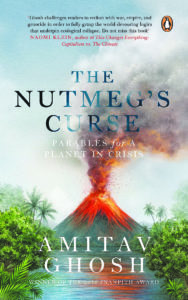 An exploitative economy in all its ruthless facets was the hallmark of colonialism across the globe in the earlier centuries, and the same economics continues to rule in the mineral-rich mines of Jharkhand and Odisha, said renowned writer and Jnanpith Award winner Amitav Ghosh. He said this while speaking at the Mathrubhumi International Festival of Letters (MBIFL) that has opened here.
An exploitative economy in all its ruthless facets was the hallmark of colonialism across the globe in the earlier centuries, and the same economics continues to rule in the mineral-rich mines of Jharkhand and Odisha, said renowned writer and Jnanpith Award winner Amitav Ghosh. He said this while speaking at the Mathrubhumi International Festival of Letters (MBIFL) that has opened here.
Ghosh, who for a brief period, was a faculty at the prestigious Centre for Development Studies here said resources have become the bane of people as their native land comes into the crosshair of exploitative economy.
“The uranium mines of Jharkhand are now being exploited by mining companies at the cost of all the local people whose lives are essentially doomed because of the resources they once had. Another good example is Niyamgiri in Odisha. It is sacred mountains for the Adivasis of the region, but they have been thrown off their land and their land has been seized by mining companies,” said Ghosh.
Presenting the background of his book, The Nutmeg Curse, to explain his concern, he said the 1,621 massacre of the native people in the Banda Islands was carried out to control the trade of nutmeg, which was a priced item and grew only in that region due to soil fertility caused by volcanic activity. This later on also led to slavery of people and many were taken from south India to work in nutmeg plantations in Banda.
History is replete with such instances where people and nature became expendable before commercial interests. Iraq and Libya were more modern recent examples of such “extractivist economics”, he said.
“Fortunately for a few years in India, we were able to hold extractivism at bay, but now this extractivism is absolutely rampant. It has become the dominant model in the Indian economy,” Ghosh said.
This is an exploitative thinking that is rooted in the 17th century European outlook that earth is a dead, clockwork machinery that can be manipulated in any way. The opposition against this was strong even in Europe as people who regarded land as sacred fought this. Women were in the forefront of this fight and the witch-hunt against them is rooted in this confrontation, he explained.
Historians rely on documents and narrations but elements of nature like a tree, mountain or volcano rarely are actors in these documentaries. But the role they played in the history of humankind is decisive, he pointed out. The global elite, who shape the world, consider non-human entities as inert forms.
This is an approach in which a coloniser uses human and non-human beings as resources to be used as slaves and commodities. “This entire continuum was also believed to be subject to the national laws that condemns certain species to extinction and extermination,” he added. (IANS)



